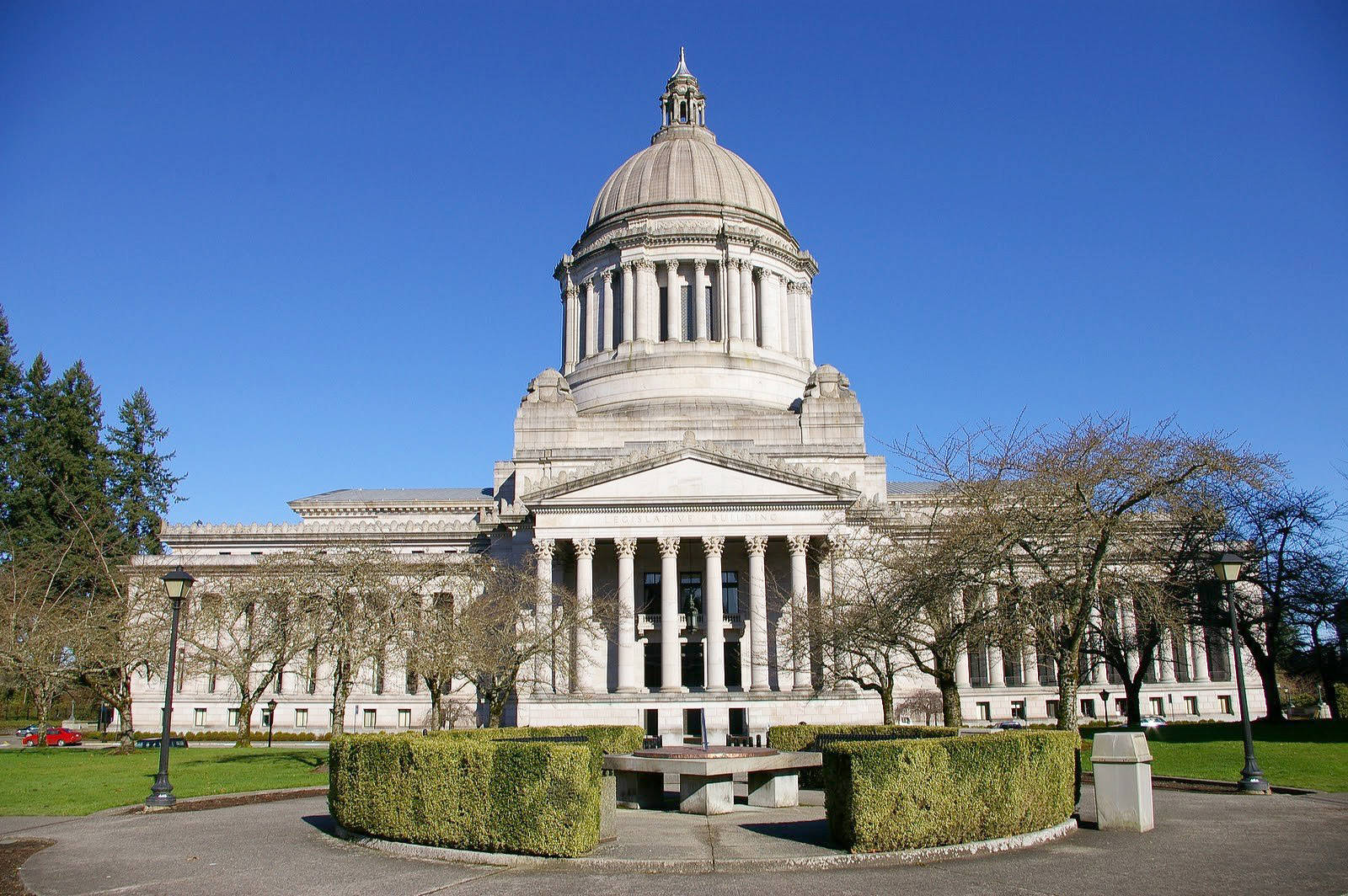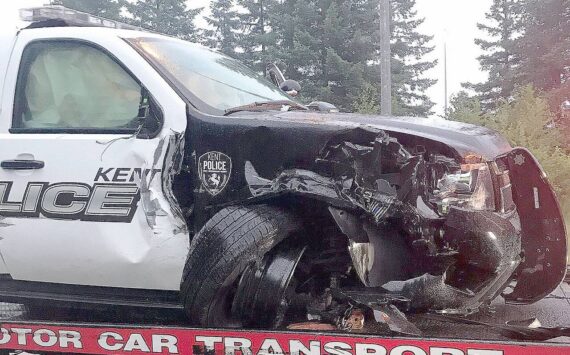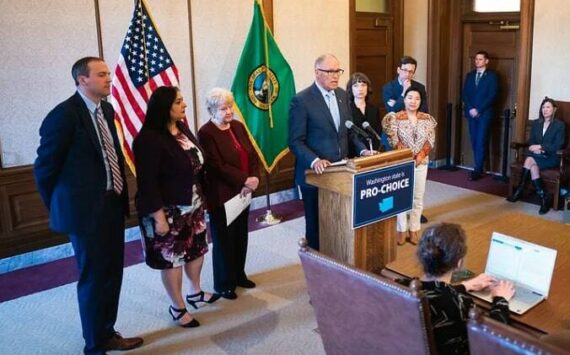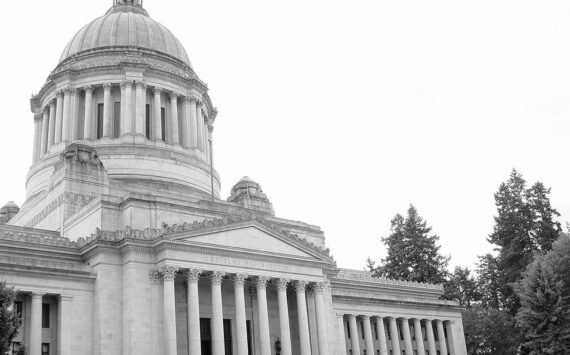A new report issued June 17 shows a crushing drop in tax collections amid the COVID-19 pandemic could sap state reserves and leave the governor and lawmakers with a billion-dollar hole to plug in the budget.
Receipts from sales, business, property and other taxes are expected to be $4.5 billion less than had been counted on for the current budget which runs through next summer, according to the revenue forecast issued by the state’s chief economist.
Even if the state drains its reserves, there will still be a $1.5 billion shortfall to erase in the coming months.
“This is a massive shortfall,” Gov. Jay Inslee said at an afternoon news conference. “We know we have many tough decisions ahead of us as a state as a result of our revenues falling off a cliff.”
And the picture doesn’t get much better for the ensuing 2021-23 budget. Collections are projected to be down another $4.3 billion with a potential deficit exceeding $6 billion, the report says.
The dour fiscal forecast spurred Inslee to block pay hikes for some executives and begin furloughs for state workers, and ignited a partisan row on when the 147 elected members of the Legislature should be summoned into special session to hash out solutions.
Inslee cancelled scheduled raises for nearly 5,600 executives and managers in agencies under his control and ordered the start of furloughs for tens of thousands of front-line workers in those departments. The moves will save an estimated $55 million, according to the governor’s budget office.
“We’re not waiting to deal with this shortfall. We’re acting,” he said. If other statewide elected officials and leaders of public higher education institutions followed suit, it would save another $91 million, he said.
Meanwhile, Republican lawmakers renewed their call for Inslee to summon lawmakers into an immediate special session, arguing that the sooner bigger programmatic decisions are made, the greater the potential for savings. And acting now could ease the degree of pain later, they contend.
“I see no reason why we are not doing that right now. We don’t have to solve this all at once,” said Sen. John Braun, R-Centralia, the lead GOP budget writer in the Senate. “We are in a hole…we should stop digging.”
They also expressed frustration at being kept out of the conversations. Inslee has not spoken directly with GOP legislative leaders in weeks but said “I know their position fairly well.”
Inslee said the situation is serious but does not precipitate a rush to action. Waiting for information — primarily whether Congress will provide another infusion of financial aid to states — could affect what actions are taken.
“These are difficult decisions,” he said of potential cuts to vital human and social services. “They don’t have to be made right now because we have this $3 billion cushion of reserves we can rely on for months.”
He said two thirds of the budget is “walled off” to cuts, either because of the state Constitution or for other reasons. That means, he said, reductions could hit vital services for the state’s most vulnerable populations the hardest. Money from Congress could prevent that.
“All of the cuts have to be focused on these people and they are going to be draconian unless we can find some solution here,” he said.
Sen. Christine Rolfes, D-Bainbridge Island, and Rep. Timm Ormsby, D-Spokane, the lead budget writers in each chamber, said a date for an extra session could be decided as early as next week.
“We are still waiting for some dust to settle to make some informed judgments and not to try to address problems with insufficient data,” Ormsby said.
Meanwhile, many in their respective caucuses are already peddling ideas for a capital gains or other new taxes to generate revenue.
House Speaker Laurie Jinkins, D-Tacoma, said her caucus will seek a blend of reductions and revenue.
”Cuts alone cannot solve it, and in fact would inflict even further pain on working- and middle-class Washingtonians by gutting essential programs and services,” she said. “But revenue alone will not close the gap either.”
Neither Rolfes nor Ormsby publicly stated their preferred approach.
“The goal is to do no harm,” Rolfes said. “We cannot recover the economy until we have the virus under control.”
Braun, and Rep. Ed Orcutt, R-Kalama, each said they opposed levying new or higher taxes on businesses.
“Tax increases have already been done,” Orcutt said, referring to a package of tax hikes enacted in 2019. “Where you go without hurting the economy further is beyond me.”
Also Wednesday, a coalition of 70 groups, including statewide labor unions and faith leaders, providers of social services and political progressives, urged Inslee and the Democratic leaders of the House and Senate to reject an austerity mind. In a letter, the group called for elimination of tax breaks for large corporations and imposing of “new taxes on the richest households who have long been given a special deal at the expense of people with low and middle incomes.”
Inslee’s order canceling pay hikes applies to directors and exempt employees who earn more than $53,000 annually in agencies under his authority.
Furloughs will start by June 28. An estimated 40,000 state employees will be required to take one furlough day per week through July 25. After that, they will be required to take one furlough day per month through the fall.
Wednesday’s directive is the latest step taken by the governor to curb spending in face of a crushing shortfall in tax collections amid the COVID-19 pandemic.
He’s also ordered agencies under his command to freeze hiring, personal services contracts and equipment purchases. Those agencies have also identified ways to slash their spending by as much as 15% in the fiscal year which starts July 1.








